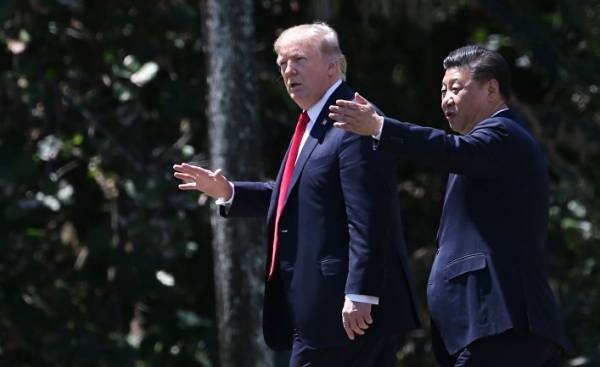
Donald trump and Chinese President XI Jinping concluded his first meeting. Observers from both sides were relieved. If during the meeting there were no diplomatic breakthroughs on major topics, this is an indication that neither the one nor the other was no sign of stiffness. As a result, have not implemented nor hopes, nor fears the global. Therefore, the question of what direction the economic relations between the United States and China and wherever the US wanted to send them to, remains open.
As important as the solution of any specific problems that plays a task definition, which from now on will focus diplomacy in the economic sphere. Having returned recently from China, where I had the opportunity to participate in major economic forum and to meet many dignitaries, I realized that of concern to many Americans the problem is either irrelevant or secondary, while the main economic problem of China is that it attracts much less attention than it deserves.
The US talk of alleged currency manipulation by China in the world economy is like a discussion of the policy of “one China” in the geopolitical sphere. At best they are unhelpful and perhaps even dangerous. While the expectation that China’s unreasonable limits, manipulated its currency for ten years after 2005, it is impossible even to imagine the extent to which China is manipulating the yuan, reducing the cost to obtain competitive advantage.
As for the amounts spent and reserves and the extent of capital controls, few countries in recent years have done as much to try to boost its currency, as did China. Speaking of bigger, the economic future of America is much more formed by the political choices made in Washington and not in Beijing. If trade with China in the United States caused the split, it is the result of a unique growth of China and increase its productive capacity, not unfair trade policies.
Therefore, the concentration of commercial interest on the foreign trade deficit of China with the United States as a whole is wrong. Yes, China is diverse in every way subsidizes exports to other countries. But if the United States will seek to stop these subsidies, or a ban on subsidized products, and this will lead to the fact that production will be transferred to Vietnam and other countries with low wages, and not to the creation of good jobs in the United States. Similarly, the reduction of trade restrictions for U.S. products in China would really help the development of the American companies, but a very small part of the additional production will be in America. American companies are expressing legitimate grievances, concerning the requirements that they share with their Chinese partners intellectual property, when investing in China, but if these problems were solved, it would be likely to transfer more production to China.
If the problems with currency and commercial diplomacy can have a positive impact on the us economy, then what is the focus of economic policy of the US towards China?
It is difficult to overestimate the scale at which China seeks to extend its “soft power” in the world with economy. Speech by Mr XI in Davos in January of this year, in which he quoted Abraham Lincoln, and represented the Chinese vision of the world economic system at a time when the United States closed in their problems, became a rhetorical demonstration of this coherent strategy.
Of course, there is the initiative of Mr. XI’s “One belt, one road” providing investments in infrastructure and foreign aid in order to link China and Europe. Not all paid attention when the Asian infrastructure investment Bank sponsored by China to rival world Bank, announced that it will invest worldwide. Chinese investment in Latin America and Africa already far exceed the investment of America, the world Bank and regional development banks. China will soon become the leading exporter of clean energy technologies.
These investments will eventually provide access to raw materials, will allow Chinese companies to obtain economies of scale and will help China to win friends. USA chose not to join the Asian infrastructure investment Bank, becoming a drag on the financial balance of the institutions of Bretton woods, not to lead the world effort on climate change, and to counteract them, and to dramatically cut foreign aid. These actions may accelerate the inevitable loss of US preeminence in the global race for prestige and influence.
The subject of the strategic economic dialogue will be the goal of global economic interaction and the role of the US and China in it. It is very important that this dialogue started as soon as possible, but it is less focused on specific short-term business interests and more on what historians will remember in 100 years.







